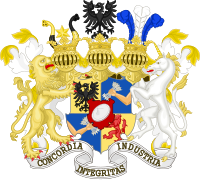
Back Rothschild-bankfamilie AF عائلة روتشيلد Arabic Familia Rothschild AST Rotşild ailəsi AZ Ротшилд Bulgarian রথচাইল্ড পরিবার Bengali/Bangla Família Rothschild Catalan خێزانی ڕۆتشیڵد CKB Rothschildové Czech Rothschild Danish
| Rothschild | |
|---|---|
| Jewish noble banking family | |
 Coat of arms granted to the Barons Rothschild in 1822 by Emperor Francis I of Austria | |
| Current region | Western Europe (mainly United Kingdom, France, and Germany)[1] |
| Etymology | Rothschild (German): 'red shield' |
| Place of origin | Frankfurter Judengasse, Frankfurt, Holy Roman Empire |
| Founded | 1760s (1577) |
| Founder | Elchanan Rothschild (b. 1577) |
| Titles | List
|
| Traditions | Goût Rothschild |
| Motto | Concordia, Integritas, Industria (Latin for 'Harmony, Integrity, Industry') |
| Estate(s) | |
| Cadet branches | |
| Website | rothschildarchive.org |
The Rothschild family (/ˈrɒθ(s)tʃaɪld/ ROTH(S)-chylde German: [ˈʁoːt.ʃɪlt]) is a wealthy Ashkenazi Jewish noble banking family originally from Frankfurt. The family's documented history starts in 16th-century Frankfurt; its name is derived from the family house, Rothschild, built by Isaak Elchanan Bacharach in Frankfurt in 1567. The family rose to prominence with Mayer Amschel Rothschild (1744–1812), a court factor to the German Landgraves of Hesse-Kassel in the Free City of Frankfurt, Holy Roman Empire, who established his banking business in the 1760s.[2] Unlike most previous court factors, Rothschild managed to bequeath his wealth and established an international banking family through his five sons,[3] who established businesses in Paris, Frankfurt, London, Vienna, and Naples. The family was elevated to noble rank in the Holy Roman Empire and the United Kingdom.[4][5]
During the 19th century, the Rothschild family possessed the largest private fortune in the world, as well as in modern world history.[6][7][8] The family's wealth declined over the 20th century, and was divided among many descendants.[9] Today, their interests cover a diverse range of fields, including financial services, real estate, mining, energy, agriculture, winemaking, and nonprofits.[10][11] Many examples of the family's rural architecture exist across northwestern Europe. The Rothschild family has frequently been the subject of conspiracy theories, many of which have antisemitic origins.[12]
- ^ "Lord Rothschild: 'Investors face a geopolitical situation as dangerous as any since WW2'". Telegraph.co.uk. 4 March 2015. Archived from the original on 10 January 2022.
- ^ Elon, Amos (1996). Founder: Meyer Amschel Rothschild and His Time. New York: HarperCollins. ISBN 978-0-00-255706-1.
- ^ Backhaus, Fritz (1996). "The Last of the Court Jews – Mayer Amschel Rothschild and His Sons". In Mann, Vivian B.; Cohen, Richard I. (eds.). From Court Jews to the Rothschilds: Art, Patronage, and Power 1600–1800. New York: Prestel. pp. 79–95. ISBN 978-3-7913-1624-6.
- ^ Rubinstein, William D.; Jolles, Michael; Rubinstein, Hilary L. (2011). The Palgrave Dictionary of Anglo-Jewish History. Palgrave Macmillan. ISBN 9780230304666.
- ^ Leeson, Robert (2014). Hayek: A Collaborative Biography: Part II, Austria, America and the Rise of Hitler, 1899-1933. Springer Publishing. p. 27. ISBN 9781137325099. Archived from the original on 26 March 2023. Retrieved 26 June 2019.
- ^ The House of Rothschild: Money's prophets, 1798–1848, Volume 1, Niall Ferguson, 1999, page 481-85
- ^ "The Rothschild story: A golden era ends for a secretive dynasty". The Independent. Archived from the original on 15 January 2006.
- ^ The Secret Life of the Jazz Baroness, from The Times 11 April 2009, Rosie Boycott
- ^ Rothschild: a story of wealth and power, by Derek A. Wilson, (Deutsch 1988), pages 415–456
- ^ The Rothschilds: Portrait of a Dynasty, By Frederic Morton, page 11
- ^ Robert Booth (8 July 2011). "Million-pound bash for rising star of the super-rich". The Guardian. London. Archived from the original on 5 May 2021. Retrieved 13 December 2016.
- ^ Cite error: The named reference
conspiracy1was invoked but never defined (see the help page).